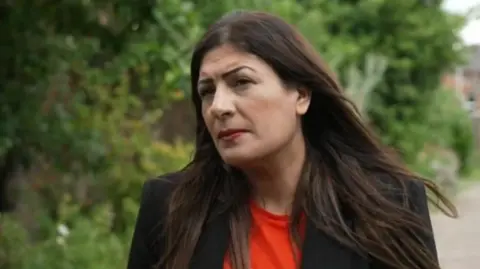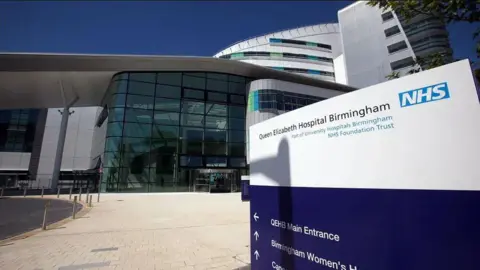Blood transfusion errors 'tip of iceberg' at trust
 BBC
BBCBlood transfusion errors where cancer patients were given the wrong type of blood on 14 occasions were just the "tip of an iceberg", a review has found.
More than 150 harmful incidents were identified within the blood transfusion group at University Hospitals Birmingham (UHB) trust between May and July last year.
A report by the Royal College of Physicians (RCP) said the trust could not show evidence of a strong safety culture, and the blood transfusion service required greater attention.
UHB said it fully accepted the findings of the report and had made significant improvements.
 Getty Images
Getty ImagesThe Birmingham and Solihull Integrated Care Board (ICB) requested the review of the blood transfusion service after seven "never events" - incidents that should never happen - were identified over four years at the trust between 2019 and 2023.
Five had been identified at the Queen Elizabeth Hospital, one at Good Hope Hospital and one at Heartlands.
There were also two further errors involving a patient at Heartlands in August 2023 before the review started.
The investigation discovered that one patient had received six wrong blood type transfusions, making a total of 14 “never events."
Urgent attention needed
A Hospital Transfusion Group meeting identified 156 harmful events that had occurred in three months between May and July 2023.
These included a woman who was given rhesus positive blood which could harm a baby if she falls pregnant and seven cases where bloods taken and put into test tubes hadn't matched the right patient.
“The review team concluded that the seven never events were the tip of an iceberg, and that urgent attention must be given to the trust’s blood transfusion service in order to prevent patient harm," the report said.

UHB had previously undertaken its own safety reviews of the never events but in the last one, despite a deputy medical director, two consultants and a quality manager being involved, they repeated two recommendations that had been made in an earlier report.
Staff also felt that management was not listening.
Dr Manos Nikolousis who blew the whistle regarding earlier fatal drug errors, said that this exemplified the culture at the trust.
“I'm not sure how units can actually operate safely when you have all these never events happening within a highly specialised service," he said.
MP for Birmingham Edgbaston, Preet Kaur Gill, said that she had already had meetings with the new health secretary, Wes Streeting, about the trust.
"Red risks cannot be allowed to continue without any action and that's exactly what happened," she said. "That's why we have the failings that we have seen here."
Ms Gill wanted the trust to show her the actions that had been taken and "how they are confident that this will not happen again".
'Absolute priority'
The RCP report accepted that the merger of University Hospital and Birmingham Heartlands Group had been a contributory factor to some of the earlier never events.
Systems were not talking to each other, local autonomy was undermined and staff were working in unfamiliar settings with different processes and protocols.
A UHB spokesman said safety of patients was an "absolute priority" and it had been working with staff to engage and educate them on safe transfusion practice.
The trust had also improved its electronic patient record to ensure its laboratories had "clear information" and had worked to strengthen and standardise processes across all of its hospitals.
“There is still work to be done, but we have made progress, and we remain committed to ensuring we eliminate the potential for transfusion-related never events occurring," it added.
Follow BBC Birmingham on Facebook, X and Instagram. Send your story ideas to: [email protected]
